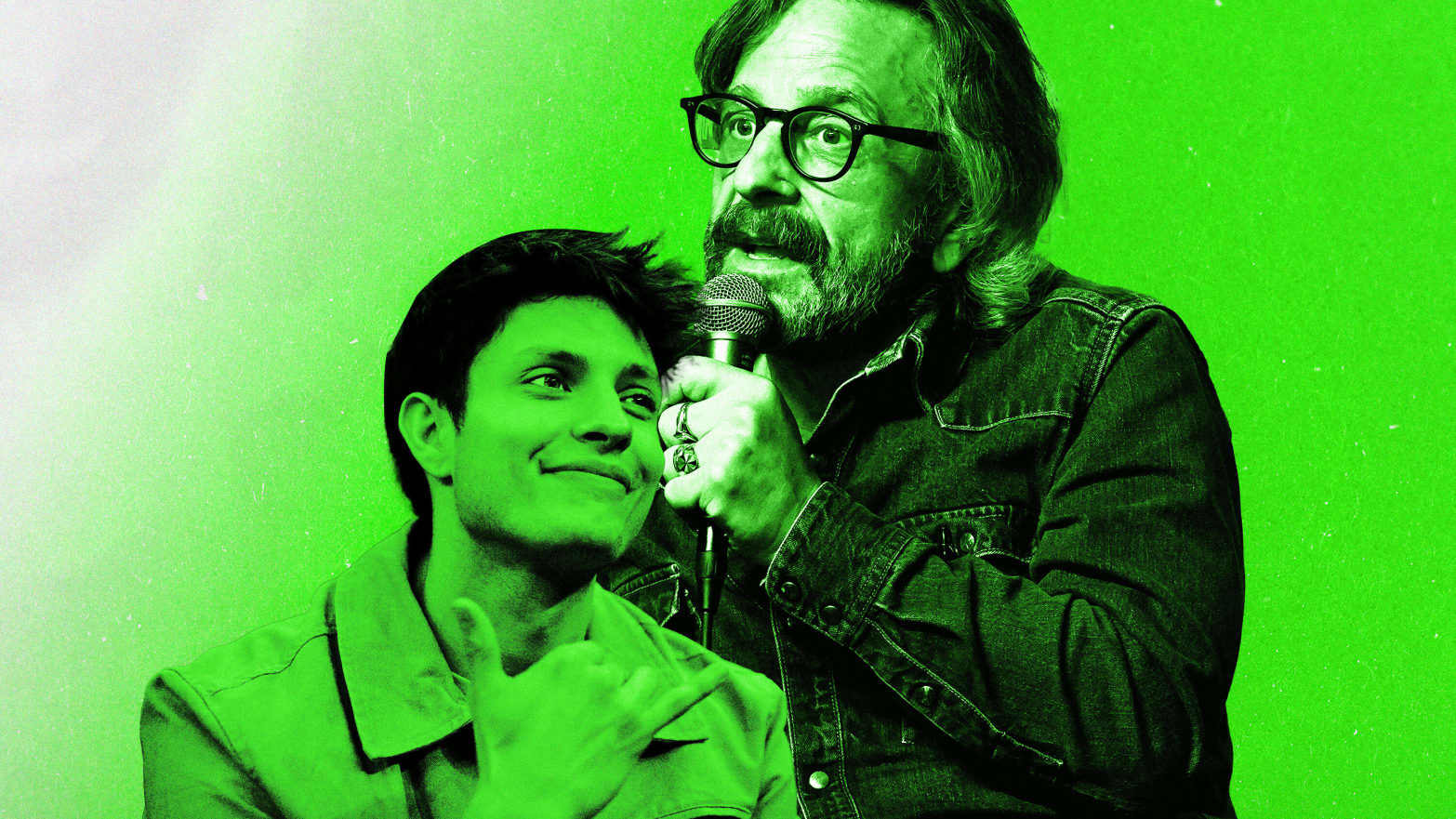Matt Rife is a bona fide hit on Netflix and a bone of contention for comedy fans and comedians alike.
The 28-year-old comedian rocketed to viral fame during the pandemic—Rife has 18.2 million TikTok followers, another 6.4 million on Instagram, and a combined 40 million views for three specials released in the past year on YouTube. Netflix pounced, and Rife’s first special for the streaming giant has done boffo numbers, landing on the platform’s global Top 10 most-watched list for two consecutive weeks. Netflix reported an estimated 10.3 million views worldwide for Matt Rife: Natural Selection through Nov. 26.
But Rife’s also been the rage for incurring rage among comedy fans for opening his Netflix performance with a domestic violence joke. Whether Rife sincerely meant to mock a restaurant hostess for her black eye or if he merely wanted to prove something to his fans and critics by provoking outrage, his gambit hasn’t won over comedian and podcaster Marc Maron.
At a New York Public Library talk Wednesday night to promote comedy historian Kliph Nesteroff’s new book, Outrageous: A History of Showbiz and the Culture Wars, Maron took my question about Rife’s purposeful pot-stirring and ran with it.
“Well, first of all, like, don't jump the gun on Matt Rife,” Maron replied. “If you don’t know who he is, he's the new It Boy of shitty comedy. And he’s taken a big chance in his career right now to shit on the mostly female audience that he accumulated through social media to sort of kiss up to these pseudo edge lords. And personally, I don’t think it's going to go well for him. And ultimately, my producer Brendan McDonald, the genius, made a good point in saying that he thinks that Matt Rife is actually mobilizing a new generation of comics to push back against what that stands for in much the way that Dane Cook did at a different time to once again, you know, be creative and bring a new energy and voice to what that doesn't represent. So, maybe within show business, there is hope.”
In fact, Rife was only 17 when he met Cook in 2012, calling him “one of my biggest role models, the man that got me into Stand Up,” and in the intervening years even toured with Cook as his opening act.
When Nesteroff noted the Rife-Cook connection, Maron joked that Rife might have a “righteous grievance” before adding: “I forget this is going out on the Internet now,” and dropping an F-bomb. “And now I’m gonna have to deal with Dane calling me, ‘Hey, dude, I thought we were good.’ Hey, look, we’re all in the same business. We’re just trying to entertain people.”
Maron has made no bones about his disdain for so-called “anti-woke” comedians, mocking them and their claims that they cannot joke about anything these days in his own HBO special earlier this year, From Bleak To Dark.
Maron and Nesteroff had broached this subject two years earlier on an episode of Maron’s WTF podcast about “Cancelled Comedy,” which seems to have informed both Maron’s HBO special and Nesteroff’s new book. Reuniting again Wednesday night in NYC, Maron noted how his stand-up contemporaries have “co-opted this position of grievance around this freedom of speech business.”
Maron and Nesteroff pointed out that Lenny Bruce, George Carlin, and Richard Pryor were handcuffed and arrested by police for uttering profanities onstage. But their defenders would argue they were “using these words to further a point,” Nesteroff said, “not merely trying to be provocative.” The author added, “Today there’s a whole genre of provocateur comedy, where a guy will go up onstage, he will say a word that he knows is gonna get an ooh and an ah, says the word or the statement, it gets the ooh and the ah. And then the comic is like, ‘What?! What?! What!’ You designed it to get that reaction and now you’re feigning this outrage.”
“It’s a false premise,” Maron said. “It’s a hackneyed idea. And what they’re actually doing is co-opting this idea that they're free speech words, but they're actually fighting for the ability and—not the right but the space to further marginalize people.”
Nesteroff said social media and mainstream media alike tend to pervert the debate by describing one side of it as censorship. “But it’s two forms of free speech pressing against each other,” he explained. “And if you’re going to defend only the bigot and not the anti-bigot, like who the fuck are you? What’s wrong with you?”
“I’ll tell you who they are. It’s half the country,” Maron replied. “They’ve perfected this propaganda because they are very organized and it’s been going on a long time that the idea of woke-ism generally speaking, you know, what does that even mean? It’s this amazing umbrella term for everything the right has been pushing back at. It just takes over everything,\ and makes it this single object-focused ideology, which doesn’t even mean anything. And now that’s the big word. And what saddens me is there were guys—and one woman, Roseanne [Barr]—who were pretty amazing comic talents, who have sort of fallen for this idea that they’re being muscled to not be able to express themselves.”
Maron said he worries that tribal intolerance is threatening democracy, and that within comedy, increasing polarization and bubbles are allowing “anti-woke” comedians to “find their market” now, whereas in the past, culture and society would pass them by. “And because of social media platforms, be able to fill rooms with people that will pay to see them for as long as this polarization exists.”
“Well, people like to hear their point of view reinforced,” Nesteroff said.
Which also is leading to generational divides. Boomer comedians chided millennials for their so-called participation trophies. For comedians within Generation X, Gen Z’s embrace of different pronouns seems to baffle them.
Nesteroff’s book follows the arcs of Mae West, Steve Allen, and Billy Wilder, among others, from young renegades and firebrands to stodgy conservatives as they got older. Of Allen, Nesteroff said, “Before he died, he wrote his last book, it's called ‘Vulgarians at the Gate,’ and it’s a bit of a camp classic. In the book. He condemns the David Spade sitcom Just Shoot Me and Dawson’s Creek and says they’re leading to the downfall of America.”
To which Maron quipped, “And I think the point is here, these guys just have to die sooner. We’re seeing it with Bill Maher now.” Realizing what he had done, he continued, “Again, I’m going to be fielding calls and probably some tweets that are not going to—it doesn’t matter.”
But ultimately, Maron brought it back to the younger generation of comics like Rife. “What we don't realize is that at any given point in time, you know the 10 comedians that are popular, there’s literally 1,000 that no one fucking knows about,” he said. “And I think it’s the same generationally now that whether the platforms or whether it's TikTok or whatever, there are a lot more comics and a lot more visibility, you can get content out there that will put you on the radar. But in order to sustain a career in show business, you must be able to do the job and the nature of that job doesn't seem to really change that much, but I do think that it is different.”
“And I think that ultimately what happens that is sad, is that when I see these younger comics, or comics a couple generations from me, and they think they're doing something amazingly new. It’s really not,” he continued. “And they think they're inventing it, and I guess every generation does that. But I think there’s hope in that it seems that true artists and true comics and people that really have something to say and are creative, generally surface in a big way. So I think that’s optimistic... Right?”

